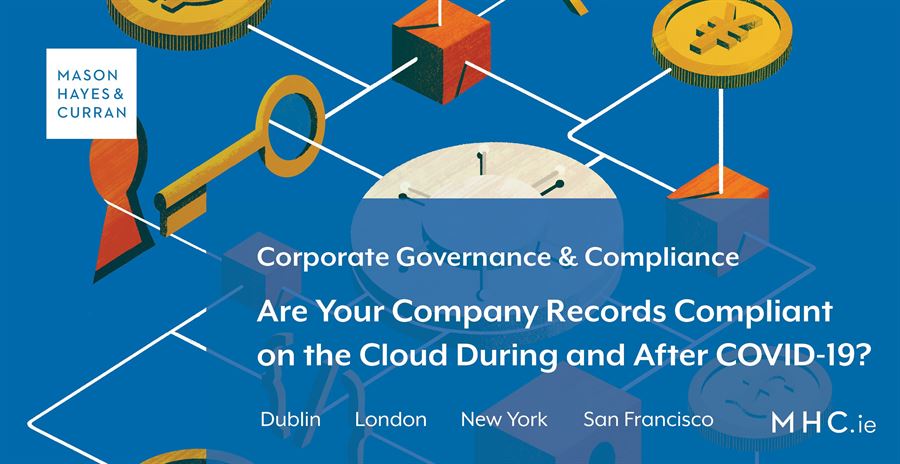Are Your Company Records Compliant on the Cloud During and After COVID-19?

Directors of Irish companies have a statutory duty to ensure that their company’s registers and accounting records are maintained in accordance with law. While those records may be maintained electronically, companies should exercise caution when using server computers and cloud computing to do so.
Company registers
Irish law requires companies to maintain the following registers:
- Register of members
- Register of directors and secretaries
- Register of directors’ and secretary’s interests
- Register of debenture holders (PLC only)
- Register of directors’ interests in contracts with the company
- Register of certain transactions, holding companies of credit institutions only, and
- Register of beneficial ownership
In addition, companies must also retain copies of certain documents, including:
- Minutes of board and shareholder meetings
- Copies of directors’ service contracts
- Copies of instruments creating charges, and
- Copies of contracts for the purchase of own shares
Accounting records
Adequate accounting records are those that are sufficient to:
- Correctly record and explain the transactions of the company
- Enable, at any time, the assets, liabilities, financial position and profit or loss of the company to be determined with reasonable accuracy
- Enable the directors to prepare the financial statements and the directors’ report, and
- Enable the financial statements to be audited
Location
A company’s registers are generally located at its registered office. Certain company registers, including minutes of general meetings and the register of members must be held, and be open to inspection, in Ireland. If the location in Ireland is not the registered office of the company, then the CRO must be notified of the location.
Unlike a company’s registers, accounting records may be held either at the registered office of the company or at another place that the directors may consider fit, either in Ireland or in another jurisdiction. However, where accounting records are held outside of Ireland, certain information and returns must be sent to and kept at a place in Ireland which will:
- Disclose with reasonable accuracy the assets, liabilities, financial position and profit or loss at intervals not exceeding six months, and
- Enable the financial statements and directors’ report to be prepared.
Electronic records
Irish law allows company registers and accounting records to be maintained electronically. However, where this is the case, company registers must be capable of being reproduced in a legible form. It is possible to provide a website address to the CRO.
Where accounting records are maintained electronically, they must be kept in a written format or in a format to be readily accessible and convertible into written form in either English or Irish.
In both cases, there is a legal requirement to guard against the falsification of records. The discovery of falsification, and adequate data security measures should be taken in this regard. These include employing the use, for example of anti-virus software, firewalls, encryption, passwords or other restricted access protocols.
Server computers
A server computer’s function is to store, retrieve and send computer files and data to other computers on a network. Under Irish company law, a server computer providing services to another computer in connection with the maintenance of company and accounting records must be kept in Ireland. This provision ensures that such records are accessible at times.
The Minister for Jobs, Enterprise and Innovation also has discretion to make additional provisions in connection with the maintenance and location of company registers and accounting records on server computers.
Cloud computing
The Companies Act 2014 specifically provides for the use of cloud computing to maintain the company registers. While there is no requirement that the cloud computing service be hosted in Ireland, we would advise that, at a minimum, the register of members and the minutes of shareholder meetings should be stored locally on a drive in Ireland.
There is no specific provision in the Act for the use of cloud computing to maintain accounting records. However, we advise that they be treated in the same manner as electronic records, and that, where the cloud is hosted outside of Ireland, financial information be kept in Ireland by way of downloading them locally on a computer or drive in Ireland.
Conclusion
It is becoming increasingly common in the current environment to rely on a cloud solution to store company registers and accounting records. While this is permissible, companies should ensure that certain records, including the register of members, minutes of shareholder meetings, and records showing the company’s financial position and profit and loss are also stored locally in Ireland, and should take precautions against falsification of these records.
For more information on remaining compliant and fulfilling your company record keeping obligations, contact a member of our Corporate Governance & Compliance team.
Share this:



